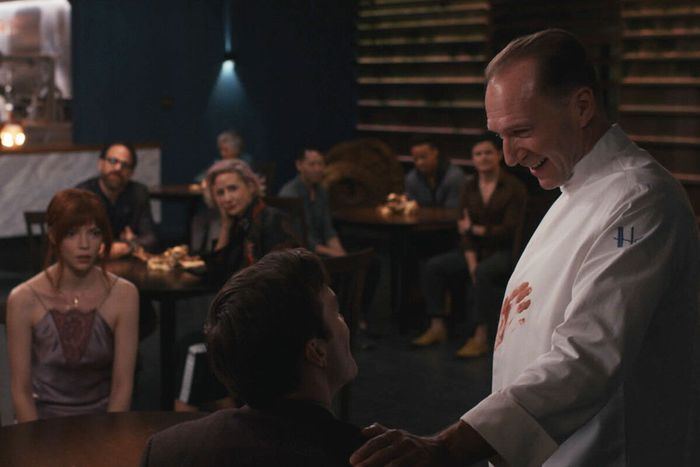
Auguste Escoffier, the inventor of the brigade system that still informs how so many commercial kitchens are run today, was inspired by bullying and battlefields. As a teenager, he got pushed around while apprenticing with his uncle, and as a 20-something army enlistee during the Franco-Prussian War, he saw potential in repurposing military structures to bring order, cleanliness, and hierarchy to the kitchen. The bullying, you could argue, didn’t go away so much as it became sublimated into the profession Escoffier helped elevate to an art, with an emphasis on obedience and discipline. When the FX series The Bear, which is essentially about a group of restaurant workers trying to figure out a better way of doing things when the only models they have are toxic, came out in June, it prompted as many PTSD shudders from industry employees past and present as it did “Yes, chef!” memes.
The kitchen staff in The Menu, a deliciously mean movie from frequent Succession director Mark Mylod and Onion alums Seth Reiss and Will Tracy, bark “Yes, chef,” too, and when they do, it’s with an unsettling martial precision. Whatever haute cuisine’s pretensions — and The Menu skewers many; it is as much black comedy as it is thriller — the kitchen is not actually a war zone. And yet at Hawthorne, a fictional restaurant that seats only a dozen customers a night at $1,250 a pop, workers are pinned between the belief that what they’re doing is worth sacrificing everything for and the reality that they have surrendered their lives to grueling service work. A sad-eyed and scary Ralph Fiennes plays star chef Julian Slowik, who’s both the staffers’ chief abuser and a fellow captive, as well as the guiding force behind a particularly ambitious evening at his exclusive eatery. Fiennes is adept with a barely there sneer, which he puts to great use here in a role that’s the most fun he’s been since Hail, Caesar!
In terms of the diners, there are a few finance bros (Arturo Castro, Mark St. Cyr, Rob Yang) more invested in the status that comes with a reservation than the experience itself. There are the celebrities: a preening food critic (Janet McTeer), her editor (Paul Adelstein), and a slightly tarnished movie star (John Leguizamo) in the company of his assistant (Aimee Carrero). Then there are the monied regulars (Reed Birney and Judith Light), as well as a simpering foodie named Tyler (Nicholas Hoult) whose date, Margot (Anya Taylor-Joy), is the film’s heroine and lone unexpected attendee — the guest list has been as carefully curated as the meal. Tyler is a superfan prone to saying things like “Chefs, they play with the raw materials of life itself, and death itself,” and he’s increasingly exasperated with Margot’s indifference to the food and accompanying narrative, though you can’t really blame her. Hawthorne, located on a small island a short ferry ride from the mainland, feels inspired by the setting of Lummi Island’s the Willows Inn and the Scandi severity of Noma in Copenhagen. But the dishes, designed by actual chef Dominique Crenn, quickly take a turn toward the absurd with a fussily plated amuse-bouche giving way to a “breadless bread course” that’s basically a series of dips — then on to something darker.
There’s no tastier meal than the rich, though what makes The Menu more satiating than other recent, glitzier skewerings of ultracapitalism is that its satire isn’t so glib that it leaves you feeling comfortably outside of the proceedings. Instead, it summons the suffocating feeling of having no way out of a doomed setup. Julian’s breakdown owes as much to the personal and the petty as it does to the systemic. And he and his collaborators — among them an aridly precise maître d’ (Hong Chau) and sous-chefs played by Adam Aalderks and Christina Brucato — have pathos even as their actions veer toward the extreme, while Mylod makes the most of the limited location by turning Hawthorne’s luxurious trappings and surroundings into just a trap. The rage at the heart of The Menu is directed at the impossible melding of art and commerce, at the way we’re taught that success at the former requires the support of the latter, even if it means making crushing compromises that drain the joy out of, in this case, the expressly straightforward pleasure of food. The film has sympathy for the sentiment that there’s no way out of this bargain, but it also appreciates the outrageousness of its own apocalyptic scenario. After all, you can always quit, walk out the door — presuming, that is, that you’re allowed to.
More Movie Reviews
- Drive-Away Dolls Is Just Fizzy Enough
- Pedro Almodóvar’s Queer Cowboy Short Is Too Sumptuous for Its Own Good
- Civil War Isn’t the Movie You Think It Is





